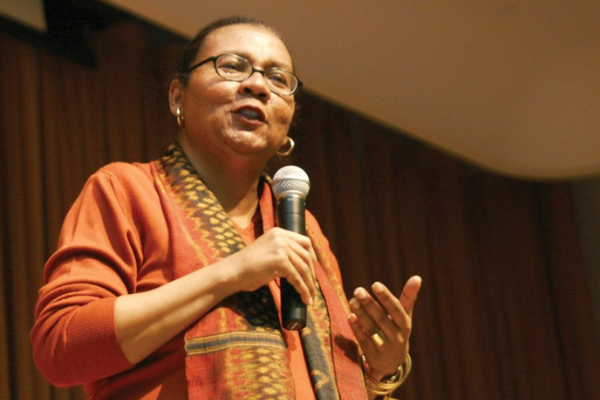As tributes flood my Twitter feed following the passing on of yet another beloved being who made so many of us feel understood and treasured, I couldn’t remember which of her quotes I see proliferating my endless scrolling made the most impact on me. In everything we learn from her existence, and her transition from this realm of consciousness, love is central to her work and way of life. Love as a tool to empathize, love as a home, love as an authority to embody, and love as a revolutionist-type political thought. I couldn’t help shake off the feeling that it was something else, something more, something deeper than love, that influences me. It took days of meditating on my first introduction to bell hooks that alerted me: it was her unapologetic exploration of boundless presence.
As a privileged African teenager, unknowingly coming across identity politics in the U.S. when I attended university, discussions of white hetero-patriarchal ideologies were to me as intense as they were out of my grasp. As someone immediately categorized as a Black woman – in a country whose acceptance of that identity is either largely romanticized or ignored – it felt like a shocking erasure of who I believed I was. Back home, my peers and I – of all colors and sizes at my international school – were “regular” teenagers, a mixture of somewhat angst-riddled, thrill-seeking, intelligent students; but never in any rush to identify ourselves outside of historically maintained ways of gender and sexuality. Looking back, I can confirm this came from our fear of being othered by our families and social systems, not because all of us identified with the upheld rules of existence.
In my quest to understand why my presence requires such an immediate and concrete identification in America, I took an interest in my Ethnic Studies courses, going as far as pursuing it as a major. bell hooks wrote, lived, and taught these concepts in a way where I can fruitfully address this new identity placed upon me without my consent, and gave me the confidence to take pride in defining myself for myself, before attempting to jump into allyship with causes I feel require my support and who humble me when they accept me as such. As a queer Black woman, focused on healing her community through her critical writing, her work breaks through narrow ways of thinking and of being, to embrace comprehensive analysis of existing oppressive systems. She shattered the illusion of self-hatred imposed by society’s exclusive and extractive pressure.
bell hooks especially shook my understanding of what it means to be in community. She wholly embodies the welcoming essence of identities that have been nauseatingly shunned and heightens our capability to intellectually challenge these labels – not to dismiss one for the other, but to form solidarity from corner to corner. Only someone who deeply understands what it feels like to be repeatedly shut out of conversations can approach complex topics with the desire to bring in more voices to the dialogue.
How refreshing—liberating really—to share this world with someone who eloquently expresses ideologies that can cut across and unify through socially constructed barriers, all the while using discourse that is easily digestible. Using a penname for her work, in the format it holds, to shift focus away from who she is, while simultaneously bringing us closer to her and the matriarchal lineage it symbolizes – further allowing us to value the identities she holds within and defends with her expression – emboldens me to use the work bell hooks brought forth, as water to my growing pursuit of meaningful existence, for I’m comforted. Where there is water, life is eternally present.


